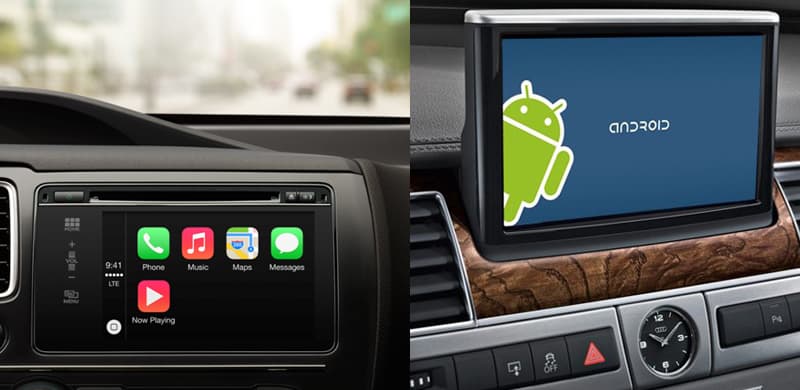
TRENDS: Will Apple CarPlay and Android Auto Change the Way Listeners Engage with Christian Radio?
By Lindsay Williams
The battle between Apple and Android continues to heat up as both companies unveiled plans for in-car systems in 2014, ushering car manufacturers into the ongoing debate. Consumers may not have as much skin in the game as say, Honda or Mercedes, but with both interfaces slated to roll out in new cars later this year, smartphone users will have yet one more way to engage their favorite apps with ease.
These new platforms will bring users’ smartphones to their dashboards, enabling safe, hands-free options for navigation, phone calls, texting and, yes, music listening. While newer models containing USB outlets already provide consumers a way to connect their personal music libraries to their car speakers, Apple CarPlay and Android Auto will make customized playlists available with a simple voice command. Moreover, third-party apps like Spotify, Pandora and iHeartRadio will be as accessible as your next Siri request. Efficiency, user-friendliness and safety are all laudable features; but the underlying question remains: How will this new technology affect traditional AM/FM radio stations, specifically Christian radio?
Surprisingly, as recent as last year, research shows that 56 percent of Christian music listeners tune in to their favorite Christian radio station while in the car. Technology may be rapidly changing, but Christian music listeners seem to be slower to engage innovative platforms. In a 2014 Jacobs Media annual CMB Techsurvey, respondents were asked if they are listening to AM/FM radio more or less than they were a year ago. Ironically, 52 percent said “the same,” 25 percent said “more” and only 7 percent said “less.”
“While the dashboard is changing, research shows that Christian radio listenership is stronger than ever,” says Christian Music Broadcasters (CMB) Executive Director Michelle Younkman. The 2014 CMB Techsurvey also revealed that 90 percent of respondents listen to Christian radio the most, compared to Pandora (17 percent), the connected car (16 percent), HD Radio (13 percent) and satellite radio (12 percent).
Listenership numbers back up these statistics as the weekly cumulative audience of Christian music stations grew 7+ million in 2014, totaling 39.4 million. Younkman notes that stations like KLTY/Dallas, WFSH/Atlanta, KLJY/St. Louis and WPOZ/Orlando continue to consistently land in the Top 5 in their respective markets.
The slow-to-adopt trend filters to all genres within the Christian industry. Although fans of hip-hop and rock are more tech-savvy, the listener demographic also skews younger. Conversely, Gospel and Southern Gospel have to take into account a much older listenership. “The average Gospel music listeners are older than you might find in pop or hip-hop music, so they may not be into the latest gadgets, fads and phone apps,” notes Pathlight Entertainment’s EJ Gaines, “but by and large, the trends still ripple into the Gospel marketplace.”
As a manager, Gaines says he heavily relies on a variety of curation platforms to define his strategy. “I always use the discovery platforms because I know that I’ll get insight from other tastemakers and fans, and those trends will help inform my management decisions,” he says.
Faith-based music listeners may be slow adopters, but Ed Leonard, President of Daywind Records, sees these new platforms as a way to attract new fans to the genre. He’s already seen the positive impact Sirius XM has played in introducing new listeners to Southern Gospel, a genre often overlooked by traditional radio.
“We have seen a tremendous increase in the popularity of Southern Gospel due to the availability of the Enlighten station on Sirius XM,” Leonard offers. “It follows that the advent of other in-car listening experiences should generate similar results. We are excited about the possibilities and hope these companies realize the uniqueness and sales potential of the Southern Gospel listener.”
While it inevitably presents a challenge to traditional AM/FM stations, new platforms offering fresh ways to engage music also open doors of opportunity spanning all genres, from pop and worship to Gospel and hip-hop. “You’ve suddenly got a new generation of music lovers who harness the power of technology and say, ‘I’ll find music I love wherever I can access new music,’’’ Gaines observes. “Access really spurs creativity, innovation and growth in any cultural context, and it’s especially true in music.”
Change may be the catalyst for innovation, but will easy access and customization overrule standard three-song sets programmed by Christian PDs? Younkman contends Christian radio’s secret weapon is and will continue to be something greater than simply music. “The top two reasons people listen to Christian radio are to hear their favorite songs and for the emotional connection,” she says. “It’s that emotional trigger that is higher in priority with Christian radio than any other format.”
Spotify and Pandora may provide customized listening experiences and ample opportunity for music discovery; however, what these apps can’t deliver on is the “me too” factor that occurs through open dialog between a DJ and the listener. Moreover, they’re missing the local connection that traditional stations can easily facilitate.
This is where Christian radio has the opportunity to shine, according to Lloyd Parker, COO of WAY Media. “Regardless of the platform, the way Christian stations can set themselves apart from other offerings will be the quality of their non-music content,” Parker contends. “Our music is available from multiple sources, and most Christian stations play a majority of the same music. Playing the right songs and music research will continue to be very important, but what will really draw listenership will be the uniqueness of our talent.”
Gaines argues the same is true across all Christian music, regardless of style. “Program directors have to figure out how to program great songs and truly engage listeners with innovative radio shows and personalities,” he says. “They’ll have to create and present content that can’t be found in my personal music collection.”
Younkman maintains the key lies in transparency. “[Radio personalities] need to focus on that emotional connection through storytelling and vulnerability,” she says.
“DJs can no longer just play music and give basic information,” Parker adds. “Entertaining hosts who can appeal on a number of levels will win. They have to be great creative personalities, smart with social media, good writers, [able to] use video creatively and ministry-minded.”
A good song may draw consumers in initially, but it’s the emotional connections with real, live, engaging people telling honest stories who will keep listeners from turning the dial.
Long-term, Parker feels these new platforms will actually challenge radio stations to evolve with the times. “As a format, it will eventually force improvement in the product for many stations, and that is a good thing,” he adds. “Christian radio will really have to provide unique quality programming to compete with all the offerings that are—and will be—available. CCM music is available through so many outlets and sources that music alone does not draw listeners to Christian radio. It is announcers that do that, and they have to be excellent. Christian radio needs to find more great talent.”
##
Lindsay Williams is a freelance writer and editor from Nashville, Tenn. She contributes to a variety of print publications and websites, including HomeLife, ParentLife, Nashville Lifestyles, and UPTV.com, among others. She also blogs about Christian music regularly at www.TheSoundOpinion.com.




